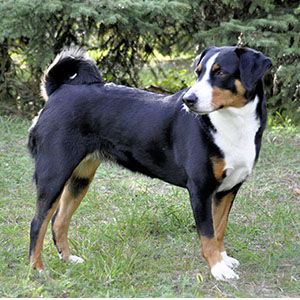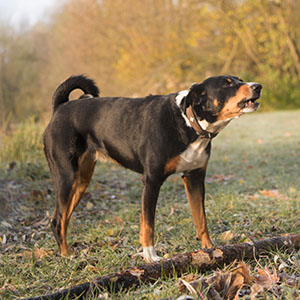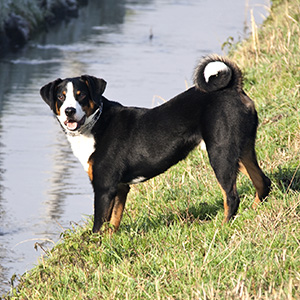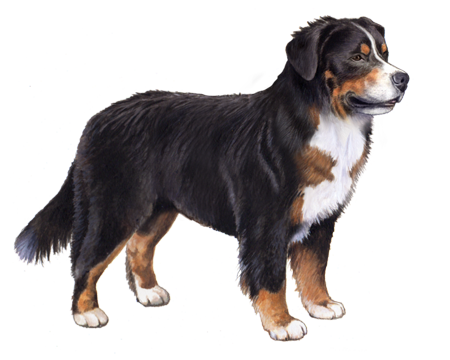
Appenzell Cattle Dog
The Appenzell Cattle Dog, as the name implies, is a cattle dog at heart, and to this day they are excellent watchdogs. They are incredibly fast and very intelligent, as well as lovingly devoted to their people. They can be wary of strangers, though, and they need plenty of exercise every day to stay healthy and happy. They’ve also been known to be heavy barkers, and they can be destructive when bored.
Interested in discovering if your dog is an Appenzell Cattle Dog?
Check out Wisdom Panel's DNA tests.

Appenzell Cattle Dog Traits
General Appearance
This medium-sized, muscular breed is agile and swift. Their slightly wavy coat is firm and short, and they are tricolored black, reddish-brown, and white.
Coat and Coloring
The Appenzell Cattle Dog has a firm and fitting double coat with a thick, shiny topcoat and an equally thick undercoat. Their tricolored hair can be slightly wavy in areas, and they come in black or Havana brown with symmetrical reddish-brown and white markings.
Distinctive Physical Traits
The Appenzell Cattle Dog is a traditional working dog of medium build. Its firm and fitting coat can be black or Havana brown with reddish-brown and white markings. It has smaller, reddish-brown spots over their eyes, as well as reddish-brown marks on their legs, chest, and cheeks.
Appenzell Cattle Dog Temperament
This good-natured breed produces loyal dogs that bond closely with their people. They can be boisterous at times, and they need to be kept busy and get plenty of exercise to avoid boredom. They are enthusiastic, and their rough ways may be too much for small children, although they would love to make playmates with kids.
Appenzell Cattle Dogs have strong, dominant personalities. They require extra work to train, which is necessary for proper socialization, especially since these are territorial dogs that make excellent watchdogs and are wary of strangers. They are loud barkers and can become destructive when bored. They require a lot of exercise because they are an active breed.


Appenzell Cattle Dog History
Bred in Appenzell, Switzerland, the Appenzell Cattle Dog is a spitz-type cattle dog that was designated as its own breed in 1898.
In 1906, the Appenzeller Sennehund Club was established to preserve the breed. Dr. Albert Heim established the first breed standard in 1914, and thus began the registration of these dogs into the Appenzell Dog Stud Book. Today, the Appenzell Cattle Dog is very popular in Switzerland and other areas of Europe. Although they are still relatively rare in the United States, they are slowly growing in numbers.
Appenzell Cattle Dog Care
Nutrition
Appenzell Cattle Dogs require a high-quality dog food that is age-appropriate—whether it’s commercially manufactured or homemade (with a veterinarian’s supervision and approval). It’s important to monitor the amount of food you give your Appenzell Cattle Dog. Reduce the portions or restrict calories if your pup gains weight.
Your veterinarian is always a good source to help provide you with appropriate nutrition and feeding guidelines.
Grooming
The Appenzell has a firm double coat that’s fairly easy to groom. Plan to brush the dog once a week to remove loose hair and keep it shiny.
All dogs require regular dental care, including at-home teeth brushing and professional dental cleanings, and Appenzell Cattle Dog is no exception. Maintaining good dental hygiene is important for their overall long-term health.
Exercise
This is an active breed that doesn't tire easily. In order to keep the Appenzell healthy—and to avoid the destruction they can cause when bored—consider daily activities like running, swimming, and playing. They also make excellent companions on activities like hiking and backpacking. After a long day that includes plenty of fulfilling exercise, the Appenzell is happy to relax at your feet.
Training
This high-spirited breed is smart, but they can be stubborn and independent. They require a firm hand when training, but they don't react well to harsh methods and prefer positive, reward-based reinforcement. They may always be wary of strangers and territorial, although proper training and socialization from a young age can mitigate these traits to some degree.

Breed Group
Mountain Dogs
This genetic group was bred for hard work in mountainous regions. Characterized by their thick coats and sturdy, larger builds they quickly became the invaluable working companions of people in endurance activities such as drafting and hauling.
Resources
https://www.Appenzellers.org/Appenzeller-temperament.html
https://www.akc.org/dog-breeds/Appenzeller-sennenhund/
http://www.fci.be/Nomenclature/Standards/046g02-en.pdf
https://www.Appenzellers.org/Appenzeller-working-dog.html
Reviewed July 26, 2020 by Cindy Elston, DVM, MPH








